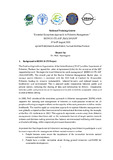| dc.contributor.author | Supongpan, Mala | |
| dc.date.accessioned | 2020-04-30T08:23:37Z | |
| dc.date.available | 2020-04-30T08:23:37Z | |
| dc.date.issued | 2015-08 | |
| dc.identifier.citation | Supongpan, M. (2015). National Training Course on Essential Ecosystem Approach to Fisheries Management. Training Department, Southeast Asian Fisheries Development Center. | en |
| dc.identifier.uri | http://hdl.handle.net/20.500.12067/1238 | |
| dc.description | The Food and Agriculture Organization of the United Nations (“FAO”) and the Department of Fisheries, Thailand has signed the Letter of Agreement (LOA) for the execution of the GEF supported project “Strategies for trawl fisheries by‐catch management” (REBYC‐II CTI; GCP /RAS/269/GFF). The overall goal of the Marine Fisheries Management Master plan, to manage marine fisheries is consistent with the FAO Code of Conduct for Responsible Fisheries, leading to resource sustainability, reduced by‐catch and reduced impact to biodiversity and environment. This is planned under cooperation between public and private sectors, including the sharing of data and information by fishers. Cooperation between public and private sectors is important to be able to find the acceptable points and in joint problem solving. In 2003, FAO introduced the ecosystem approach to fisheries management (EAFM) which supports the planning and management of fisheries as multi‐purpose resources for all people and having no negative effects on the capacity of the next generation to follow similar livelihoods. The need to apply an ecosystem approach to capture fisheries management is now globally accepted and has been endorsed in international decision‐making; for example, at the Rio +20 conference in 2012. This approach represents a move away from fisheries management systems that focus only on the sustainable harvest of target species, towards systems and decision‐making processes that balance environmental well‐being with human and social well‐being, within improved governance frameworks. At present the Thai Department of Fisheries is encouraging local fishers to participate in and be more responsible for management of their coastal resources so that:
People become more aware the importance of the interaction between natural resources and ecosystems;
People have a wider perception about fishing ground resources and EAFM for sustainable development; Balancing well‐being of the ecosystem with human well‐being through good governance. Under the second LOA between FAO and The Department of Fisheries for implementation of the REBYC‐II CTI Project in Thailand, the following specific objectives were identified:
Increase knowledge of ecosystem resource management.
Increase knowledge and capacity in critical thinking, research analyses, planning, and systematic project implementation and evaluation;
Increase opportunities for the exchange of ideas, altitudes and experiences between trainers, officers and community representatives. | en |
| dc.format.extent | 1 pages | en |
| dc.language.iso | en | en |
| dc.publisher | Training Department, Southeast Asian Fisheries Development Center | en |
| dc.subject | Fisheries Management | en |
| dc.subject | Essential‐Ecosystem | en |
| dc.subject | REBYC‐II | en |
| dc.subject | EAFM | en |
| dc.title | National Training Course “Essential‐Ecosystem Approach to Fisheries Management” | en |
| dc.type | Technical Report | en |
| dc.contributor.corporateauthor | REBYC-II CTI | en |
| dc.contributor.corporateauthor | SEAFDEC | en |
| dc.contributor.corporateauthor | FAO | en |
| dc.contributor.corporateauthor | gef | en |
| dc.contributor.corporateauthor | Department of Fisheries Thailand | en |

